- Home
- A. G. Riddle
Departure Page 2
Departure Read online
Page 2
“Very true. They’re caring for my medical needs right now.”
“I’m serious. Leave those and get off the plane.”
He grabs the corded plane phone theatrically. “Let’s have a round of applause for Captain Crash, the mini bottle Nazi.” He fakes the roar of a crowd, slugs back the bottle he’s holding, and wipes his mouth. “Tell you what,” he says, slurring a little. “Let’s compromise. You can have these bottles as soon as I’m done with them.”
I step toward him. Harper moves between us. A firm hand on my shoulder stops me.
It’s the doctor.
“I’ve finished,” she says. “You need to see this.”
Something in the doctor’s tone rattles me a little. I give 2D a hard look before turning and following the doctor, Harper at my side.
She stops at the seat of a middle-aged black passenger in a business suit. He’s propped against the wall, dead still, his face covered with dried blood.
“This man died of blunt force trauma to the head,” the doctor says, her voice low. “He was bludgeoned by the seat back in front of him and the bulkhead to the side. He was buckled in tight, but the chairs in the business section aren’t as far apart as those in first class. The whipping motion of the descent and crash was deadly for the weaker and taller passengers, anyone whose head could connect with the seat in front. He’s one of three fatalities.” She motions to the rest of business class, where seven people are still seated. “We’ve got four who’re alive but unconscious. I’m not optimistic about them. One, I wouldn’t want to move. Three are pretty banged up, but they might be okay if we could get them to a hospital.”
“Okay. Thanks, Doc.”
“Sabrina.”
“Nick Stone.” We shake hands, and Jillian and Harper introduce themselves.
“I wanted to show you this,” Sabrina says, “because we’ve all likely suffered some head trauma. It’s imperative that all the survivors keep their blood pressure within a normal range. Any of us might have asymptomatic head trauma, which could result in stroke or cerebral hemorrhaging if we’re excited or exert ourselves.”
“That’s good to know.” The truth is, I’m not sure what to do with this new information. I’m not exactly sure what to do about anything at this point. The three women are looking at me expectantly, waiting.
My first thought is of the main section of the plane. If business class fared this poorly, I can’t imagine what economy is like, where the seats are closer together and the whiplash as the plane broke up and crashed would have been far more deadly. If there’s anyone still alive in the back half of the plane, they’re going to need a lot of help.
“We need to find the rest of the plane.”
Blank stares.
I focus on Jillian. “Is there any way we could contact the people back there?”
She shakes her head, looking confused. “Phone’s dead.”
Phone. “What about your cell phone? Do you know the staff at the rear? Their numbers?”
“Yes, I do.” Jillian pulls out her phone and turns it on. “No signal.”
No luck with my phone either. “Maybe it’s because we have American carriers?”
“I live in Heidelberg,” Sabrina says. “Maybe . . . no, I’ve got no service either.”
“I’m on EE,” Harper says, but she, too, has no service.
“All right,” I say. “I’m going to go look for them.”
“I’ll join you,” Harper says.
Jillian volunteers as well, but we decide that she should stay with the remaining passengers until help arrives. While Harper gathers supplies, I notice an Asian man—young, maybe late twenties—seated in business class, hunched over a glowing laptop screen that shines bright in the otherwise dark cabin.
“Hey.”
He looks up, scans my face quickly, then resumes typing.
“You need to get off the plane.”
“Why?” He doesn’t bother to look up.
I lower my voice and squat to look him in the eye. “It’s safer on the ground. The plane feels stable, but it’s propped up by trees that could give way at any time. We could roll or drop quickly.” I motion to the torn metal behind him, where there are still intermittent sparks. “And there may be a risk of fire. We’re not sure.”
“There’s no risk of fire,” he says, still typing, his eyes moving quickly side to side. “I need to finish this.”
I’m about to ask what could be more important than surviving in the aftermath of a plane crash, but Harper is at my side now, handing me a bottle of water, and I decide to focus on the people who want my help.
“Remember,” Sabrina says, “any excess exertion could be fatal. You may not be in pain, but your life could be in danger.”
“Got it.”
As we leave, Sabrina moves to the young Asian man and begins speaking quietly. By the time we reach the exit, they’re practically shouting at each other. Clearly not a doctor-patient relationship. They know each other. Something about the scene doesn’t quite sit right with me, but I can’t think about that now.
At the bottom of the chute, three people are hunched over on the ground or leaning against trees, holding their heads. But I saw at least two dozen people exit. Where is everyone? I stare into the woods.
Slowly I start to make out glowing lights bobbing in the forest, moving away from the plane—a stream of people spread out in the darkness, a few running. The light must come from flashlight apps on their phones.
“Where’re they going?” I ask no one in particular.
“Can’t you hear it?” says a woman sitting on the ground right next to the chute, though she doesn’t lift her head from her knees.
I stand still, listening. And then, in the distance, I hear them.
Screams.
People crying out for help.
CHAPTER FOUR
Harper
THE DENSE ENGLISH FOREST IS DARK, LIT ONLY by the dim crescent moon hanging above and the smattering of cell phone lights through the trees ahead. The beady white lights thrash back and forth in the hands of runners, their twinkling loosely synchronized with the snap of branches underfoot.
My legs are burning, and my lower abdomen and pelvis send waves of pain through my body every time my feet hit the ground. The words stroke and hemorrhage run through my mind, along with the doctor’s warning: Any excess exertion could be fatal.
I have to stop. I’m holding Nick back, I know it. Without a word I let up and put my hands on my knees, trying desperately to catch my breath.
Nick halts abruptly beside me, sliding on the forest floor. “You okay?”
“Fine,” I say between pants. “Just winded. Go on. I’ll catch up.”
“The doctor said—”
“I know. I’m fine.”
“Feel light-headed?”
“No. I’m okay.” I glance up at him. “If I live through this, I’m going to get a gym membership, go every day. And no drinking until I can run a five-K without stopping.”
“That’s one option. I was thinking that if we live through this, a stiff drink will be my first order of business.”
“Excellent point. Post-drink, it’s straight to the gym for me.”
Nick’s staring at the stream of glowing lights, which have begun to converge like a swarm of fireflies on something beyond the trees, something I can’t yet see. His face is a mask of concentration. I wonder what he does for a living. Is it something like this? Crisis management? He’s good at it, comfortable telling people what to do, for sure. I’m not. I wonder how else we’re different, whether we’re anything alike at all. And I wonder why I’m curious at all, especially in the middle of all this.
“I’m ready,” I say, and we resume our jog, a bit more slowly than before. A few minutes later the forest gives way to open air.
Nothing could have prepared me for what I see.
About twenty people stand close together just beyond the tree line, on the shore of a lake that strikes me as o
dd. Its shoreline is too round and well-formed, as though it were man-made. But it’s the thing that rises from the lake about fifty feet out that terrifies me: a jagged dark hole like the mouth of a massive fish—the open front end of the main section of the plane, broken off roughly where the wings begin. One row of chairs faces us at the front of the passenger compartment, but they’re all empty.
The plane’s tail must be resting on the bottom of the lake. What’s holding up the middle, propping the ripped end up out of the water? The landing gear? The engines? Trees? Whatever it is, it’s giving way. The lower edge of the torn fuselage is about fifteen feet above the water, but it’s sinking a little lower every few seconds.
It’s chilly for mid-November. My breath is a white plume against the night. That water has to be frigid.
Movement inside the plane. A balding man runs up the aisle but stops at the precipice. He grips the seat back as he peers out, his face white with fear, trying to work up the nerve to jump. His decision is made for him. A burly younger man slams into him from behind and they tumble over the edge together, the second man’s leg catching briefly on a piece of twisted metal. He spins, hitting the water at an awkward angle but missing the first man. The movement pulls my eyes down to the water, and I realize that two other people are already thrashing there, swimming toward the shore. More who’ve made it are huddled together on the bank, shivering, drenched. I step closer, trying to discern what happened from brief snatches of shaky speech.
We hit the water going backward . . .
The force—I thought I was going to go through my seat . . .
I crawled across three people. All dead, I think. I don’t know. They weren’t moving. What was I supposed to do?
I wonder just how cold that water is, how long it will take to die of hypothermia out there.
A man in a navy sport coat appears in the mangled opening. He’s crouching at the edge, steeling himself to jump, when Nick’s booming voice echoes across the lake.
“Stop! You jump, and you kill everyone left on that plane.”
It’s bloody dramatic, but it’s got the man’s attention—not to mention mine and everyone else’s on the bank.
Nick steps to the water’s edge. “Listen,” he calls to the man, “we’re going to help you, but you’ve got to get everyone left alive to the opening.”
The man on the plane—around fifty, I would guess, a little paunchy—just stands there, looking confused. “What?”
“Focus. The plane is sinking. When the water starts pouring into the cargo hold below, it will pull the plane down fast. You—and anyone else still conscious—have got to work together. Wake up as many people as you can, then find anyone who’s alive but can’t move and get them to the opening. You do that, and we’ll do the rest. Understand?”
The man nods slowly, but I can tell he’s in shock. He can’t process it all. Nick seems to realize that, too. He continues, his voice calmer and slower this time.
“What’s your name?”
“Bill Murphy.”
“Okay, Bill. You’re going to get everybody alive to the opening, and then you’re going to wait. Everybody to the opening and wait. Understand?” Nick pauses, lets his words sink in. “Bill, is there anybody else conscious in there?”
“I think so . . . yeah.”
“How many?”
“I don’t know. Five. Ten. I don’t know. It’s dark.”
“That’s okay. Go and talk to them now. Tell them to help you get everybody to the opening and wait. Everybody to the opening and wait.”
Bill turns and vanishes into the darkness of the cabin. I move to Nick’s side. “What’s the plan?”
“Still working on it,” he says under his breath, glancing over at the crowd. There are about thirty people on the shore by now, bloodied people from the front of the plane and the shivering, wet survivors who’ve made the swim. He turns toward them, raising his voice. “Do any of you know CPR?”
Two hands go up, one reluctantly.
“Good. I want you to stand over here. Some of the people coming out may not be breathing. You’re going to do the best you can with them. If they don’t respond after the first attempt, move to the next person.” He looks back at the group. “Now, if any of you cannot swim, step over here.”
Another smart move. He’s making volunteering the default—if you want out, you have to step out. Six people shuffle over. I wonder how many of them really can’t swim.
A woman shivering on the bank speaks with equal parts fear and force. “I can’t go back into that water. I’ll die.”
“Me neither,” says a redheaded man beside her.
“You have to—please, my husband’s still on there,” an older woman wearing a yellow sweater pleads, her voice cracking.
“This is suicide,” says a long-haired teen wearing a Sex Pistols T-shirt.
Nick steps between the group from the front of the plane and the wet survivors, separating them. “You all don’t have to go back in the water,” he says to the swimmers. “You’ll work with the folks that can’t swim, drying people on the bank.” He goes on quickly, cutting a few protests off. “But first, right now, you need to run back to the front section of the plane and gather all the blankets and the life vests. We need them both to save the people coming out.”
It’s a good idea. The blanket-to-person ratio in first and business class was unbelievable. There’ll be plenty. But I still don’t understand what his plan is.
“Besides, the exercise will warm you up and keep your blood pumping.” Nick claps his hands. “Let’s go. Right now. And bring back a dark-haired woman named Sabrina and the flight attendant, Jillian. Find Sabrina and Jillian, and tell them to bring the first-aid kit. Remember, blankets and life vests—all of them.”
Reluctantly the nonswimmers lead the soggy survivors into the woods. The rest of us—twenty-three souls, counting Nick and me—stand and watch them go. To our right, I can hear banging in the plane. Its bottom edge is now only ten feet above the water. I swear it’s sinking faster.
On the bank, an overweight man with a nasty gash down his face says, “We’ll never make it there and back, dragging someone else. It’s too cold. They barely made it across one way, alone.”
“That’s true,” Nick says. “But we’re not going to be in the water that long. And none of you are swimming to the plane and back.”
A chorus of muttered protests builds, gaining strength by the second as voices join in.
We’ll drown . . .
Wait for professionals . . .
I didn’t sign up for this . . .
“You have to!” Nick shouts, silencing the crowd. “You have to, okay? We all have to. We don’t have a choice. Listen to me. Somebody loves each and every person on that plane. They’re somebody’s son. Someone’s daughter. They’re mothers and fathers, just like some of you. That could be your son or daughter on there. Your husband or wife, waiting, unconscious, helpless. Right now someone’s mother is checking her phone at home, wondering when she’ll hear from her son. In another hour, she’ll start to worry, and if we don’t go get those people, she’ll never see or talk to her son again, and it will be because we were too scared to wade into that water and save him. I can’t live with that on my conscience, and I know you can’t either. It could just as easily be any one of us on that plane, sitting there, alive but unconscious, waiting to drown. And they will drown, without us. If we don’t help, right now, they die. No one else is coming for them. It’s us, here and now, or they die. That’s it. We didn’t sign up for this, but nobody else is here. No one will save those people if we don’t. Every second we waste, another person dies. There are probably two hundred people in that section of the plane, and their lives are in our hands. I have a plan, and I need your help. If you want to sit here on the bank and watch them drown, step out of the group.”
No one moves a muscle. Save for the faint commotion in the plane, it’s dead quiet. I take a breath, realizing I’ve been holding
it while Nick spoke.
“Good. The first thing we’re going to do is make a fire. Who has a lighter?”
“Right here.” A middle-aged man wearing a New York Giants sweatshirt steps forward, holding it out.
“Thank you.” Nick takes it with a nod. “Okay, everyone run into the woods and bring back as much wood as you can carry. Thirty seconds. Don’t bother with anything that isn’t already on the ground. Go. Hurry.”
He turns to me. “Gather some small branches and twigs and break them up.”
We follow the others into the woods, returning with armfuls of kindling. Setting his down, Nick hunches over the pile. A few seconds later, the first tentative flame is flickering. I add my take to it, and as the rest return from the woods with their own twigs and branches, it grows quickly into a small bonfire. God, the heat feels good. And that’s not all. Rescue teams have got to be looking for us by now, and the fire can only speed up their search.
“All right. Good work,” Nick says, standing up from the fire to focus on the group huddled around the flames. “Here’s the plan. We’ve got enough people to make two lines. We’re going to stretch out, spacing ourselves at about arm’s length all the way to the plane. When the plane gets to just above water level, we’ll wade in quickly, swim to our positions, and start passing the survivors down the lines to the bank. Speed is the key. The people who come off will have life vests on, so those of you in the deeper water should be able to push them to the next person in line. Everybody in the water above their waist gets a life vest, so you don’t have to tread water. This is important: don’t stay in the water longer than you can stand it. If you get too cold, if you feel your limbs going numb, tap out and come to the fire. Warm up, and if you’re able, get back as soon as you can. Once the people coming out get dry and warm, they can go back and join the line. Okay?
“One last thing. If you’re a strong swimmer—if you’ve ever been a lifeguard, or you swim regularly, or even if you’re just in really good shape and can hold your breath for a while—come see me right now.”
Three people step forward, all younger guys, twenties and early thirties.

 The Atlantis Gene: A Thriller
The Atlantis Gene: A Thriller The Solar War (The Long Winter Book 2)
The Solar War (The Long Winter Book 2) The Extinction Files Box Set
The Extinction Files Box Set The Atlantis Trilogy Box Set- The Complete Series
The Atlantis Trilogy Box Set- The Complete Series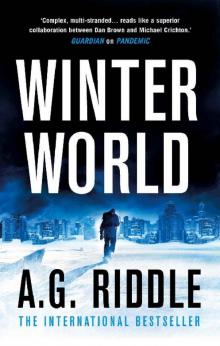 Winter World
Winter World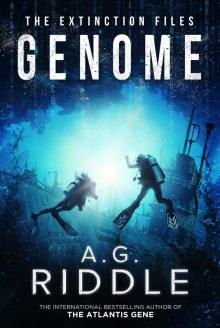 Genome
Genome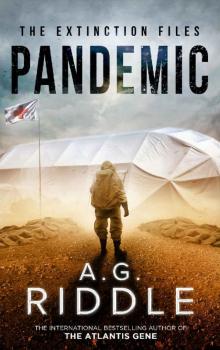 Pandemic (The Extinction Files Book 1)
Pandemic (The Extinction Files Book 1) The Atlantis Gene: A Thriller (The Origin Mystery, Book 1)
The Atlantis Gene: A Thriller (The Origin Mystery, Book 1)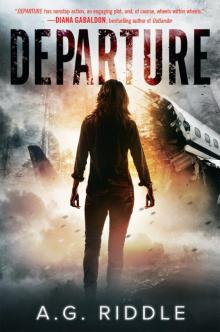 Departure
Departure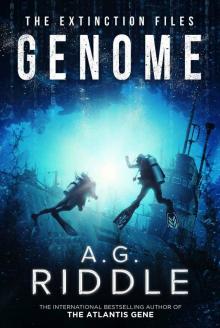 Genome (The Extinction Files Book 2)
Genome (The Extinction Files Book 2) The Atlantis World (The Origin Mystery, Book 3)
The Atlantis World (The Origin Mystery, Book 3) The Atlantis Plague: A Thriller (The Origin Mystery, Book 2)
The Atlantis Plague: A Thriller (The Origin Mystery, Book 2)